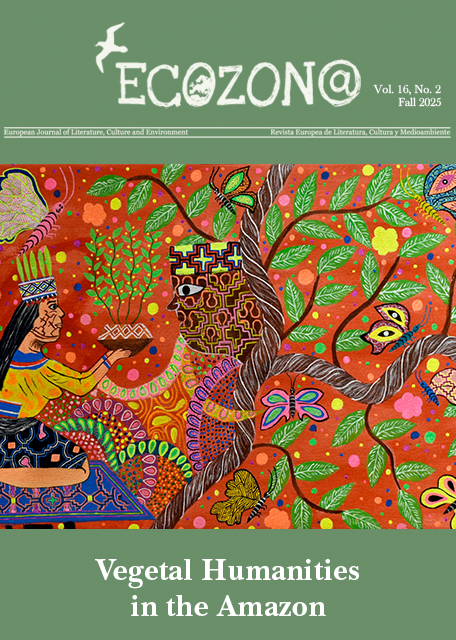<b>The American Waste: A New Take on the Conquest of the West in Paul Auster’s novel <i>Travels in the Scriptorium</i></b> // El desecho americano: Una nueva versión de la conquista del Oeste en la novela <i>Travels in the Scriptorium</i> de Paul Auster
DOI:
https://doi.org/10.37536/ECOZONA.2018.9.2.2352Schlagworte:
Alternative history, counterfactual, embedded narrative, the errand into the wilderness, American specialness, the myth of the West // Historia alternativa, contrafactual, narrativa incrustada, misión en el desierto, singularidad americana, mito del OesteAbstract
The subject of the article is the 2006 novel Travels in the Scriptorium by Paul Auster, which contains an embedded, alternative history of the USA. The article aims to demonstrate that Auster’s novel offers a revision of two essential myths of the American nation. The precise moment in the history of the USA that Auster’s novel reinvents is the time before the Mexican War and before taking over the Southwest and California. The Mexican War and its political consequences marked the transition of the USA from a republic upholding its libertarian and progressive ideals to an invading imperial power. The shift in the American policy toward its neighboring nations and peoples is reflected in Auster’s novel in the presentation of the westward expansion as a brutal invasion. Auster’s novel heavily revises the two formative myths of the American state, the myth of the West and the “errand in the wilderness,” with Manifest Destiny as its later incarnation justifying the imperialist mission. The wilderness itself is divested of spiritual significance, desacralized, as the Alien Territories are converted into the arena of carnage and indiscriminate slaughter. It is unreservedly sacrificed to the interests of the emerging imperialist enterprise, which is nothing less than the ultimate consequence of the original Puritan venture—the taming of the wilderness and the creation of a model Christian state for the rest of the world to admire.
Resumen
El presente artículo gira en torno a la novela Travels in the Scriptorium (2006) de Paul Auster, en la que se narra una historia alternativa de los Estados Unidos. El artículo pretende demostrar que la novela de Auster ofrece una revisión de dos mitos esenciales de la nación norteamericana. El momento preciso de la historia de los Estados Unidos que reinventa la novela de Auster es la época anterior a la Guerra de Estados Unidos-México y antes de que se produjera la anexión del suroeste y de California. La Guerra de Estados Unidos-México y sus consecuencias políticas marcaron la transición de los EE.UU. desde una república que defendía sus ideales libertarios y progresistas a una potencia imperial invasora. El cambio de la política estadounidense con respecto a las naciones y pueblos vecinos se refleja en la novela de Auster al presentar la expansión hacia el oeste como una invasión brutal. La novela de Auster revisa en gran medida los dos mitos formativos del estado estadounidense: el mito del Oeste y la “misión en el desierto”, con el Destino Manifiesto como su encarnación posterior que justifica la misión imperialista. La propia naturaleza salvaje es despojada de su significado espiritual, desacralizada, a medida que los Territorios Foráneos se convierten en una arena para la carnicería y la matanza indiscriminadas. Esta naturaleza salvaje se sacrifica sin reservas en aras de los intereses de la empresa imperialista emergente, la cual es nada más y nada menos que la consecuencia última de la empresa puritana original: la domesticación de la naturaleza y la creación de un estado cristiano modelo para que el resto del mundo lo admire.
Downloads
Downloads
Veröffentlicht
Ausgabe
Rubrik
Lizenz
Authors who publish with this journal agree to the following terms:
a) Authors retain copyright and grant the journal right of first publication with the work simultaneously licensed under a Creative Commons Attribution License that allows others to share the work with an acknowledgement of the work's authorship and initial publication in this journal (CC BY-NC for articles and CC BY-NC-ND for creative work, unless author requests otherwise.
b) Authors are able to enter into separate, additional contractual arrangements for the non-exclusive distribution of the journal's published version of the work (e.g., post it to an institutional repository or publish it in a book), with an acknowledgement of its initial publication in this journal.
c) Authors are permitted and encouraged to post their work online (e.g., in institutional repositories or on their website) prior to and during the submission process, as it can lead to productive exchanges, as well as earlier and greater citation of published work (See The Effect of Open Access).










